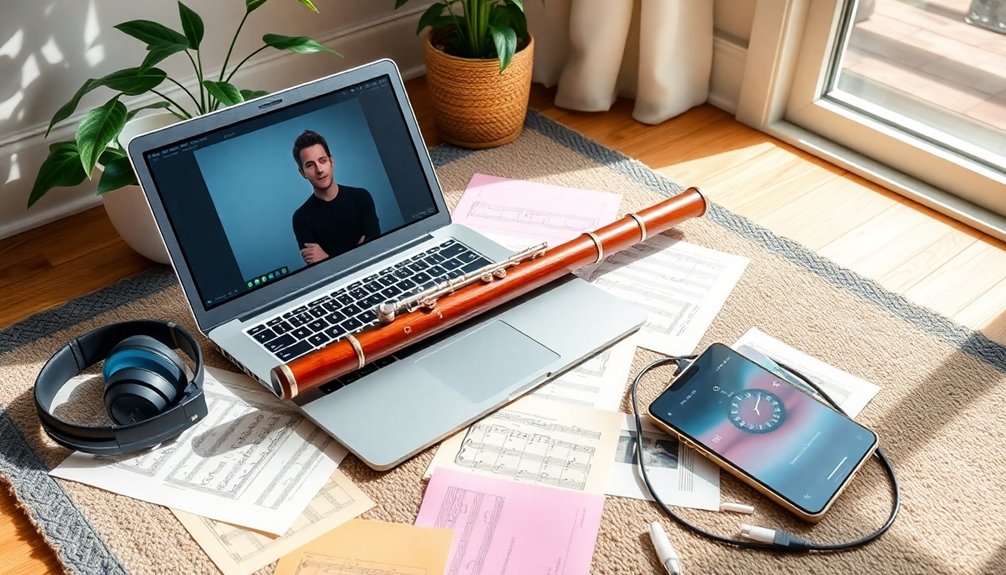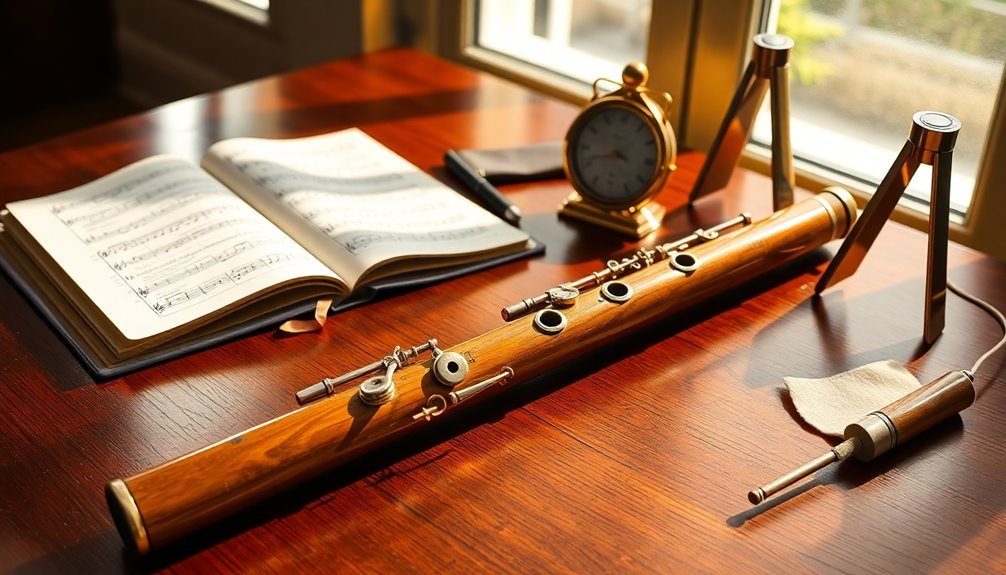To learn flute at home effectively, start by setting up a consistent practice routine. Aim for shorter, focused sessions of 15-30 minutes, and keep your goals specific to stay motivated. Next, utilize online resources like tutorials and instructional videos to break down techniques and songs. Finally, invest in quality materials; a well-made flute and method books can greatly enhance your learning experience. With these strategies, you'll foster your skills and confidence quickly. There's so much more to explore about mastering the flute, so let's keep the momentum going and uncover additional tips!
Key Takeaways
- Establish a consistent practice routine with short, focused sessions of 15-30 minutes to enhance skill retention and mastery.
- Utilize online resources such as tutorials and instructional videos to break down techniques and improve your playing.
- Invest in a quality flute and method books to support your learning and provide structured guidance.
- Set specific, measurable goals and monitor your progress to stay motivated and adjust your practice plan as needed.
- Join online communities to connect with fellow learners, share experiences, and receive encouragement on your musical journey.
Set Up a Practice Routine

Establishing a consistent practice routine is essential for mastering the flute. To get started, you'll want to set specific goals that will guide your practice sessions. Think about what you want to achieve—whether it's improving your tone, learning a new piece, or mastering a technique. By having clear, measurable goals, you'll stay motivated and feel a sense of accomplishment as you reach them.
Next, focus on time management. Decide how much time you can realistically dedicate to practice each day. It's better to practice for shorter periods consistently than to cram all your practice into one long session. Consider breaking your practice into manageable chunks, like 15-30 minutes, focusing on different aspects of your playing during each session. This approach not only keeps you engaged but also helps reinforce what you learn.
Creating a schedule can help you stick to this routine. Write down your practice times and goals, and treat them like appointments you can't miss. Share your goals with friends or fellow flute players; having a support system can make your journey even more enjoyable and fulfilling.
Lastly, be flexible. Life can get busy, and that's okay. If you miss a day, don't be hard on yourself—just get back on track the next day. Remember, everyone progresses at their own pace, and what matters most is your commitment to learning and growing as a flutist. Incorporating a structured daily practice schedule can further enhance your consistency and skill retention.
Utilize Online Resources

Explore a wealth of online resources to enhance your flute learning experience. The internet is brimming with tools that can help you progress in your flute playing journey. One of the best ways to start is by diving into online tutorials. These tutorials often break down techniques and songs into manageable steps, making it easier for you to grasp new concepts. Plus, many are created by experienced musicians who understand what beginners need.
You'll find a variety of platforms offering both free and paid tutorials. YouTube is a fantastic place to discover countless instructional videos. Search for specific techniques or songs, and you'll likely find a tutorial that resonates with you. Engage with these videos by practicing alongside them, and soon you'll notice your skills improving.
Another valuable resource is digital sheet music. Instead of flipping through physical books, you can access a vast library of flute music online. Websites like Musicnotes and Sheet Music Plus provide an extensive collection of pieces, from classical to contemporary. This way, you can easily find music that excites you and aligns with your skill level.
Consider joining online communities or forums dedicated to flute players. These spaces allow you to connect with fellow learners, share experiences, and seek advice. Engaging with others won't only motivate you but also create a sense of belonging in your musical journey. Additionally, many tutorials offer interactive features that enable you to monitor your progress over time, enhancing your learning experience.
Embrace these online resources, and watch your flute skills flourish!
Invest in Quality Materials

While online resources can greatly enhance your flute learning experience, investing in quality materials is equally important. When you choose the right flute, it not only supports your learning but also boosts your motivation. Beginner kits from reputable flute brands can make all the difference. Opting for these kits guarantees you have everything you need, from the instrument to cleaning supplies, which is essential for maintaining your flute.
Start by researching the most trusted flute brands. Yamaha, Gemeinhardt, and Trevor James are known for their quality instruments and beginner kits. These brands offer flutes that are designed specifically for new players, assuring that they're easier to play and produce a better sound. A well-made flute can greatly affect your learning curve, helping you develop proper techniques more effectively. Additionally, consider the key system of the flute, as most beginner flutes are designed in the key of C, making them easier to learn and play.
Don't just focus on the flute itself; consider investing in other materials, like method books and instructional videos. A solid method book from a respected author can guide you through your practice sessions and provide structured learning.
Pairing these resources with your quality flute will create a thorough learning experience that feels cohesive. Ultimately, investing in quality materials fosters a sense of belonging in the musical community.
You'll feel more connected to your instrument and more motivated to practice. So, take the plunge and invest wisely—your future flute journey will thank you for it!
Frequently Asked Questions
How Long Should I Practice the Flute Each Day?
When deciding how long you should practice the flute each day, consider your practice schedule and daily goals.
Aim for at least 30 minutes to an hour, focusing on specific techniques or pieces. Consistency is key, so find a time that works for you.
You'll see progress if you stick to your routine. Remember, it's not just about the minutes; it's about the quality of your practice that really counts.
What Are Common Mistakes Beginners Make While Learning Flute?
When learning the flute, you might make common mistakes like improper embouchure and incorrect finger placement.
Failing to form the right embouchure can lead to unclear tones, so practice shaping your lips correctly. Additionally, make certain your fingers cover the holes fully; gaps can cause squeaks and missed notes.
By addressing these issues early, you'll build a solid foundation and feel more confident in your playing.
How Can I Improve My Flute Tone Quickly?
Want to improve your flute tone quickly? You're not alone!
Start with breath control; take deep, relaxed breaths to support your sound.
Next, focus on embouchure adjustment—you'll notice a significant difference.
Make certain your lips are firm yet flexible, allowing the air to flow smoothly.
Experiment with different angles and pressure until you find what works best for you.
With consistent practice and patience, you'll achieve that warm, rich tone you desire!
What Are Effective Warm-Up Exercises for Flute Players?
To warm up effectively, start with long tones to enhance your breath control. Focus on maintaining a steady airflow while playing different notes.
Next, practice scales and arpeggios to improve your finger dexterity. Incorporate articulation exercises, like tonguing patterns, to develop clarity in your playing.
Remember to gradually increase the tempo as you progress, ensuring you stay relaxed and in control. These exercises will help you build a solid foundation for your flute playing journey.
How Do I Care for My Flute at Home?
Caring for your flute at home is essential for its longevity and sound quality.
Start with regular flute cleaning after each use; wipe down the exterior with a soft cloth to remove moisture.
Use a cleaning rod and cloth to clean inside the tubes.
For maintenance tips, check pads and springs periodically for wear.
Store your flute in a protective case to avoid damage.
With these steps, you'll keep your flute in top shape!
Conclusion
By setting a practice routine, tapping into online resources, and investing in quality materials, you're on your way to mastering the flute, much like a sculptor chiseling away at marble. Remember, every note you play is a step closer to your symphony. Embrace the journey, stay curious, and don't shy away from challenges. With dedication and creativity, you'll transform your home into a stage, and soon, your melodies will resonate like the whispers of the wind through the trees.






